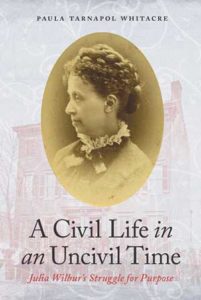A Civil Life in an Uncivil Time: Julia Wilbur’s Struggle for Purpose
Reviewed by Gwen Gosney Erickson
August 1, 2018
 By Paula Tarnapol Whitacre. Potomac Books, 2017. 320 pages. $32.95/hardcover or eBook.
By Paula Tarnapol Whitacre. Potomac Books, 2017. 320 pages. $32.95/hardcover or eBook.
Buy from QuakerBooks
The story of Julia Wilbur’s life and work as an educator and advocate for African Americans in Civil War-era Washington, D.C., and Alexandria, Va., is documented in Wilbur’s own diaries (donated by her great-nephew, noted Quaker Douglas Steere, to Haverford College’s archives). Paula Tarnapol Whitacre further contextualizes the life and times of Julia Wilbur with thorough research to weave together a compelling narrative. Wilbur’s life story is engaging, as she lived through a time of transformational change. The opportunities available to her in the chaos of wartime service allowed her to participate in meaningful interracial work. Descriptions of Wilbur’s family relationships illustrate the wide range of reactions to the war—including family members who enlisted in the Union Army and others who remained home in upstate New York.
While Wilbur grew up in a Quaker family and continued to have connections to Friends in New York through networks of family and friends, her work was not done through the auspices of a Quaker organization, and there are no references to her personal spiritual life or participation in Friends meetings. This is not a spiritual autobiography. The struggles Wilbur encounters are practical dilemmas as a nineteenth-century woman seeking to live and work independently and taking active roles in advocacy endeavors often at odds with male leadership.
Readers familiar with Quaker and abolitionist history will appreciate references to familiar names—such as Susan B. Anthony, Frederick Douglass, and Amy Post—who intersect with Wilbur’s activities in New York. Those familiar with the narrative of Harriet Jacobs’s escape from slavery will appreciate the opportunity to read about her later life working in partnership with Wilbur to provide education and much-needed basic necessities for African American freedom seekers. Descriptions of Alexandria and Washington in the midst of war are illuminating with their focus on living conditions for African Americans and the bureaucracies at play. Julia Wilbur’s life and struggle took place more than 150 years ago, but remain relevant. This book presents tensions that continue to challenge individuals who seek their life purpose while negotiating societal expectations in a landscape rife with racism and social injustices.



Comments on Friendsjournal.org may be used in the Forum of the print magazine and may be edited for length and clarity.